Enter Stage Right: The Alkazi-Padamsee Family Memoir
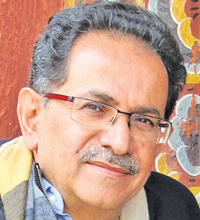 Author: Feisal Alkazi
Author: Feisal Alkazi
Publisher: Speaking Tiger Books
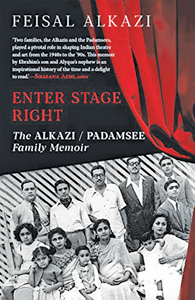 The Alkazi-Padamsee, both names are legendary; the Alkazi and Padamsee clans contributed much to the formation and recognition of modernism in both Indian theatre and art. It all started when Bobby or Sultan Padamsee, the eldest Padamsee brother, (the two families had 17 siblings between them, several of whom would distinguish themselves in theatre and the arts) had to return to Bombay after just six months as a student at Oxford due to the outbreak of World War II.
The Alkazi-Padamsee, both names are legendary; the Alkazi and Padamsee clans contributed much to the formation and recognition of modernism in both Indian theatre and art. It all started when Bobby or Sultan Padamsee, the eldest Padamsee brother, (the two families had 17 siblings between them, several of whom would distinguish themselves in theatre and the arts) had to return to Bombay after just six months as a student at Oxford due to the outbreak of World War II.
Enter Stage Right is a very arresting memoir of two theatre families who were first bound to each other by the love of theatre and then by a bond formed out of marriage. In all of this, Feisal Alkazi (the son of Ebrahim and Roshen Alkazi and nephew of Alyque Padamsee) speaks of his heritage of theatre and the arts, of Bombay in the 40s, and how the theatre company formed by Sultan Padamsee grew, paving way to one of the biggest alliances in the world of theatre and art in independent India – that of the Alkazis and the Padamsees.
The memoir is not just about the families, the lives, the family tree and the anecdotes but is also about the city, the transformation of art in Bombay, and how the city grew from brick to brick and sometimes its decline as well. The writing takes us back in time and it was worth every turn of the page. It made us see the city differently and also its art scene. Alkazi talks of how Art Heritage opened in Delhi, about Pearl Padamsee and her contribution to the arts, ultimately rounding it off with what’s the current scenario. Enter Stage Right is a delightful read. I cannot wait to go back to the world of theatre and watch those performances.
****
House of Sticks: A Memoir
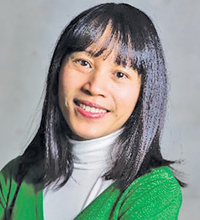 Author –Ly Tran
Author –Ly Tran
Publisher - Scribner Book Company
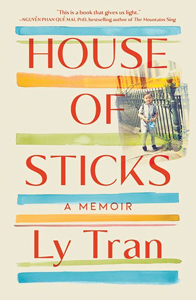 An intimate, beautifully written coming-of-age memoir recounting a young girl’s journey from war-torn Vietnam to Ridgewood, Queens, USA and her struggle to find her voice amid clashing cultural expectations.
An intimate, beautifully written coming-of-age memoir recounting a young girl’s journey from war-torn Vietnam to Ridgewood, Queens, USA and her struggle to find her voice amid clashing cultural expectations.
Ly Tran is just a toddler in 1993 when she and her family migrated from a small town along the Mekong river in Vietnam to a two-bedroom railroad apartment in Queens. Ly’s father, a former lieutenant in the South Vietnamese army, spent nearly a decade as a POW, and their resettlement is made possible through a humanitarian program run by the US government. Soon afte,r they arrive, Ly joins her parents and three older brothers sewing ties and cummerbunds piece-meal on their living room floor to make ends meet.
As they navigate this new landscape, Ly finds herself torn between two worlds. She knows she must honour her parents’ Buddhist faith and contribute to the family livelihood, working long hours at home and eventually as a manicurist alongside her mother at a nail salon in Brownsville, Brooklyn, that her parents take over. But at school, Ly feels the mounting pressure to blend in.
A growing inability to see the blackboard presents new challenges, especially when her father forbids her from getting glasses, calling her diagnosis of poor vision a government conspiracy. His frightening temper and paranoia leave an indelible mark on Ly’s sense of self. Who is she outside of everything her family expects of her?
Told in a spare, evocative voice that, with flashes of humor, Ly weaves together her family’s immigration experience with her own fraught and courageous coming of age, House of Sticks is a timely and powerful portrait of one girl’s struggle to reckon with her heritage and forge her own path.
****
Survivors: Children’s Lives After the Holocaust
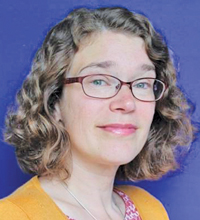 Author - Rebecca Clifford
Author - Rebecca Clifford
Publisher - Yale University Press
 How can we make sense of our lives when we do not know where we come from? This was a pressing question for the youngest survivors of the Holocaust, whose pre-war memories were vague or non-existent. In this beautifully written account, Rebecca Clifford follows the lives of one hundred Jewish children out of the ruins of conflict, through their adulthood and into old age.
How can we make sense of our lives when we do not know where we come from? This was a pressing question for the youngest survivors of the Holocaust, whose pre-war memories were vague or non-existent. In this beautifully written account, Rebecca Clifford follows the lives of one hundred Jewish children out of the ruins of conflict, through their adulthood and into old age.
Drawing on archives and interviews, Clifford charts the experiences of these child survivors and those who cared for them—as well as those who studied them, such as Anna Freud. Survivors explore the aftermath of the Holocaust in the long term, and reveal how these children—often branded ‘the lucky ones’—had to struggle to be able to call themselves ‘survivors’ at all. Challenging our assumptions about trauma, Clifford’s powerful and surprising narrative helps us understand what it was like living after, and living with, childhoods marked by rupture and loss.
The author of this book Rebecca Clifford is an Associate Professor of Modern European History at Swansea University. It’s an original and engrossing book which delicately unpicks the myth of post-war survivor silence and restores a voice to the children of the Holocaust.
Survivor’s: Children’s Lives After the Holocaust liberates the history of child survivors from obscurity. It elevates the experience of each child survivor and weaves a narrative that shares the collective trauma of these youngest victims. Clifford’s style makes this account accessible to any reader, and gives voice to those who were likely to be forgotten at a time when, with the passing of many older survivors, we must be particularly vigilant to ensure that the atrocities of the past will not be forgotten.
